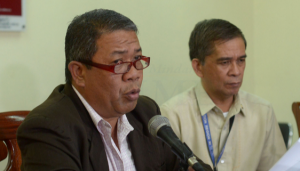
The Department of Education (DepEd) XI yesterday announced the “total closure” of 55 Salugpongan Ta’Tanu Igkanogon Community Learning Center Inc. in the region.
In a press briefing held yesterday at its regional office, DepEd Davao spokesperson Jenielito Atillo said the closure order was the result of the investigation conducted by the five-man fact-finding committee, which found “substantial evidence” that the center committed various irregularities and offenses, including non-compliance of the curriculum standards set by the DepEd.
Addressed to Salugpongan executive director Ma. Eugenia Nolasco, DepEd assistant regional director Evelyn Fetalvero
sent the Sept. 5 resolution of the fact-finding committee, which also directed the center to turn over all the records of the students to the DepEd School’s Division office for proper custody.
The Salugpongan already received a copy of the order last Monday morning. Copies of the order were also furnished to all school division superintendents in the region, the chair of the Regional Development Council and the chair of the Regional Peace and order Council XI.
Atillo said DepEd created the fact-finding committee because “we do not want to limit our efforts to the complaints of National Security Secretary Hermogenes Esperon against Salugpongan.” The committee was formed after DepEd issued a temporary suspension against the Salugpongan on July 10.
“We want to dig deeper more and expand the horizons of the investigation,” Atillo said.
The committee was chaired by Maria Ines Asuncion, CESO V, and co-chaired by Atty. Arvin Antonio Ortiz, with Roy Enriquez, Janette Veloso and Isidra Despi as members.
Asuncion and her team then conducted a series of conferences attended by concerned officials, including school heads of localities where the Salugpongan operates. These include Compostela Valley, Davao del Norte, Davao Oriental and this city.
Other stakeholders called during the conferences included the leaders and members of the Indigenous Cultural communities, the National Commission of Indigenous People (NCIP), the Armed Forces of the Philippines (AFP) and the National Intelligence Coordinating Agency (NICA).
On Aug. 14, the tribal chieftains in areas where Salugpongan operated testified. A former student and a former Salugpongan organizer narrated their experiences during their stay at the center the following day.
On Aug. 27, the team conducted a conference with the Salugpongan officials for them to counter the allegations.
After the investigation, the team found out the following:
a. Salugpongan did not comply with curriculum standards set by DepEd;
b. Salugpongan brought its students away from their home without the consent of their parents and used them to generate funds by making them perform the plights of the Lumad in violation of the DepEd’s child protection policy;
c. Teachers of Salugpongan are not passers of licensure exam for teachers;
d. Salugpongan operates within the ancestral domain of the indigenous peoples (IP) community without obtaining the mandatory consent of the concerned IP communities and certification from the National Commission on Indigenous Peoples;
e. Some Salugpongan students did not have Learners Reference Number, in violation under DepEd Order No. 26, 2015;
f. Salugpongan has misrepresented its enrollment data. The data contained in the documents it submitted did not match the data found in the Learners Information System.
Atillo said the Salugpongan even taught its students “Bayang Mahiwaga,” not the “Lupang Hinirang,” as the national anthem, in violation of Sec. 35 of the Republic Act No. 8491.
He said Salugpongan also engaged in historical revisionism. Based on the testimony of Asenad Bago, a former student, the school taught them that a certain Fr. Faustino Victorino is the national hero, supplanting Dr. Jose Rizal.
“Salugpongan, as a school, should make the education of its students as its priority. However, the revelation of the students would point to the fact that it is not the case,” the resolution said. “The students are instead not only encouraged to, but even commanded, to attend rallies.”
Bago testified that it’s a school policy that they would be marked present if they would attend rallies even if they were not in class. The rallies would even last for two weeks.
“This runs counter to the assertion of the Salugpongan that the participation of the students in the rallies are voluntary,” the resolution said. “Participation in rallies appears to be not only encouraged but made as part of their curriculum.”
Bago also said they are taught the alphabet as “A for Armas and B for Bala.” He said the teacher drew weapons, such as M14 and M16, and demonstrated how to dismantle such firearms inside the classroom.
For the five years that he was at the Salugpongan, Bago said he and his classmates were only taught literacy and numeracy. The DepEd curriculum for Grade 1 to Grade 10 requires the teaching of all subject areas, including the Mother Tongue, Filipino, English, Mathematics, Science, Araling Panlipunan, Edukasyon sa Pagpapakatao, Music Arts Physical Education and Health (MAPEH) and Livelihood Education.
In an affidavit, volunteer Salugpongan teacher Melvin Mansalood Loyod said the module that they were using did not cover all the subjects in the DepEd curriculum. Instead, the lectures they were teaching included how to conduct protest rallies against the government, learning the song of the New People’s Army, the presentations of Lumads being tortured, among others.
AFP Chief of Staff Lt. Gen. Noel Clement said that DepEd closure order is “very good news to protect our IPs.”
Nolasco, in an interview with ABS-CBN’s Southern Mindanao TV Patrol, said the closure order was imposed without due process.
Nolasco said they already debunked all the allegations raised by Sec. Esperon.
Of the 55 schools, seven teach kindergarten-age pupils; 38 cater to Lumads from kindergarten to grade 6, and 10 are junior high schools. The schools are situated in remote places, often inaccessible by land transportation.
Salugpongan started in 2006 as a group aiming to unite IPs in defense of the ancestral domain. It later evolved into basic education schools. It got registration certificate from the Securities and Exchange Commission (SEC) in 2011.
The DepEd recognition of the Salugpongan Community Learning Centers started with the issuance of an order in 2014, during the time of then DepEd Sec. Armin Luistro.

